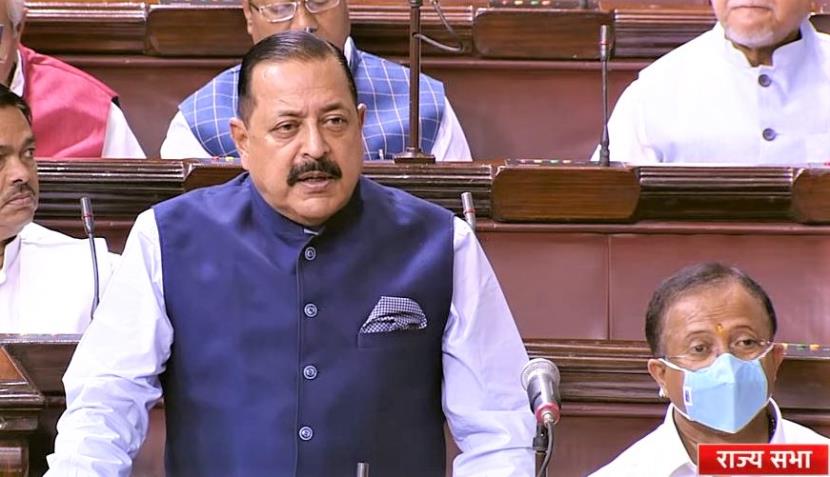Dr Jitendra updates Rajya Sabha about ISRO Space collaboration with NASA

Mar 23, 2023
NEW DELHI: Union Minister of State (Independent Charge) Science & Technology; Minister of State (Independent Charge) Earth Sciences; MoS PMO, Personnel, Public Grievances, Pensions, Atomic Energy and Space, Dr Jitendra Singh today updated Rajya Sabha about the Indian Space Research Organization (ISRO) Space collaboration with the National Aeronautics and Space Administration (NASA), an independent agency of the U.S. federal government, and informed that the ISRO and the NASA have jointly manufactured an Earth Science satellite named, NISAR (NASA-ISRO Synthetic Aperture Radar).
In reply to a question, Dr Jitendra Singh stated that the mission objectives of the satellite are- Design, Develop and launch Dual Frequency (L and S band) Radar Imaging Satellite and to Explore newer applications areas using L & S Band microwave data especially in surface deformation studies, terrestrial biomass structure, natural resource mapping and monitoring and studies related to dynamics of ice-sheets, glaciers, forests, oil slick etc.
The Minister said, the satellite is configured with I-3K bus and the instrument identified for SAR is based on the innovative Sweep SAR technique configured in both L and S band in polarimetric configuration for wide swath and high resolution.
The spacecraft will orbit the Earth in a sun synchronous orbit of 747 Km with an inclination of 98.4 degree for a 12-day repeat cycle.
Dr Jitendra Singh said, while NASA is delivering the L-Band SAR payload, high precision GPS and 12m unfurlable antenna, ISRO is delivering S-band SAR payload, spacecraft bus and facilitating launch. The total expenditure incurred on realization of NISAR satellite by ISRO as on February, 2023 is Rs. 469.40 Crore, excluding launch cost.
In reply to another question in the same House, Dr Jitendra Singh stated that the Government of India has taken several steps for building research infrastructure in our academic and research institutions.
Dr. Jitendra Singh said that a significant enabling policy framework has been put in place for promoting research in the country. Some of the targeted Programmes include: Fund for Improvement of S&T Infrastructure (FIST) in University departments and Higher Educational Institutions; Promotion of University Research and Scientific Excellence (PURSE) for pro-actively support for strengthening the R&D base of the performing Universities; Sophisticated Analytical Instrument Facilities (SAIF) to provide the facilities of sophisticated analytical instruments to the researchers in general and specially from the institutions which do not have access to such instruments to pursue R&D activities.
The Minister added that these facilities provide adequate research infrastructure for researchers. The funding policy ensures support for basic equipment, optimal infrastructure facilities, ready access to information systems, maintenance of equipment, networking, databases & scientific journals and also computational facilities. Autonomous institutions under the Ministry of Science and Technology with state of art infrastructure offer sophisticated research environment to carry out R & D work in frontier areas of science and engineering.
Dr Jitendra Singh said that the Department of Biotechnology (DBT) has implemented a competitive Research Grant system to inculcate the competitive research environment through supporting the research grants and providing fellowships at various levels such as Graduate, Post Graduate, Doctorate, Post-Doctorate and Faculty in universities. DBT is implementing schemes like DBT-Junior Research Fellowship Programme (DBT-JRF), DBT-Research Associateship Programme (DBT-RA), M K Bhan Young Researchers Fellowship Programme (MKB-YRFP), Ramalingaswami Re-entry Fellowship.
The Minister mentioned that to promote research excellence in colleges and universities across the country, Science and Engineering Research Board (SERB) formulated the program called TARE- (Teachers Associateship for Research Excellence). The scheme aims to facilitate the mobility of faculty members working in a regular capacity in state universities/ colleges and in private academic institutions to carry our research work in established public-funded central institutions such as IITs, IISC, IISERs, National Institutions (NITs, CSIR, ICAR, ICMR labs and other central Institutions) and central universities.
Dr Jitendra Singh also added that Council of Scientific and Industrial Research (CSIR) provides grant-in-aid support to publicly funded institutions/ universities for carrying out R&D activities in project mode in diverse areas under its New Millennium Indian Technology Leadership Initiative (NMITLI) Scheme. CSIR also promotes knowledge sharing by way of funding to national/international seminars/symposia by the Indian academic and R&D institutions. CSIR through its National S&T Human Resource Development Programme has been providing doctoral and postdoctoral fellowships to young budding researchers through its various fellowship programmes such as JRF-NET, SPMF, SRF-Direct, Research Associateships and CSIR-NPDF. These young researchers are basically involved in science and technology development in existing Universities, colleges, R&D Institutions etc.